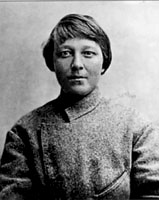Maria Nikiforova
| Maria Grigorʹevna Nikiforova | |
|---|---|

Maria Nikiforova.
Its origin unclear, this photo is believed to have been taken in Yelizavetgrad (c. 1918).
|
|
| Native name | Марія Григорівна Нікіфорова Мария Григорьевна Никифорова |
| Nickname(s) | Marusya |
| Born | 1885 Alexandrovsk, Russian Empire |
| Died | 1919 (aged 33–34) Sevastopol |
| Allegiance |
|
| Service/branch |
Alexandrovsk Revkom (1918) |
| Years of service | 1914-1919 |
| Rank | Commander (Атаманша) |
| Commands held |
|
| Battles/wars | |
| Relations | Witold Brzostek (husband) |
| Other work | Deputy leader of Alexandrovsk Revolutionary committee (Революционный комитет) (1918) |
Alexandrovsk Revkom (1918)
Maria Grigor'evna Nikiforova (Ukrainian: Марія (Маруся) Григорівна Нікіфорова; Russian: Мария Григорьевна Никифорова; 1885–1919), was an anarchist partisan leader. A self-described terrorist from the age of 16, she was known widely by her nickname, Marusya. Through her exploits she became a renowned figure in the anarchist movement of 1918–1919 in Ukraine during Russian Civil War.
Born in Alexandrovsk (now Zaporizhia), Ukraine, in 1885, Maria's father was an officer and hero of the Russo-Turkish War of 1877–1878. At the age of 16, she left home and became a babysitter, sales clerk, and ultimately a factory worker, with a position of bottle washer in a vodka distillery. She joined a local group of anarcho-communists.
She adopted a strategy of motiveless terrorism (bezmotivny terror), staging a number of bombings and expropriation missions, including bank robberies. Captured, her involvement in these activities led to a death sentence, later commuted to life imprisonment. She served part of her sentence in the Petropavlovsk prison in St. Petersburg, before being exiled to Siberia in 1910. From there she escaped to Japan. She went from there to the United States, then Spain, and finally arrived in Paris. By 1913 she had become well known by a nickname, Marusya, a Slavic diminutive form of "Maria", though when or how she acquired the name is not known.. She was very familiar with it, using it as a signature and was addressed by strangers with it. In Paris, she married Witold Brzostek, a Polish anarchist and friend, as a matter of convenience. With the outbreak of World War I, she sided with Peter Kropotkin's anti-German position, in favor of the Allied powers. She applied and graduated from a French officer college, serving in the Macedonian front.
...
Wikipedia
